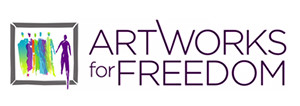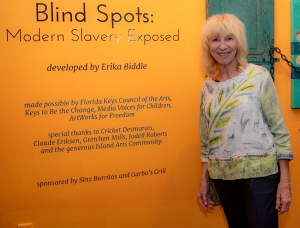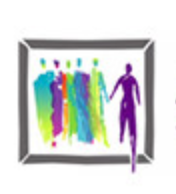Erika Biddle has always felt drawn to civic engagement and raising awareness of important issues around her, including the growing human trafficking epidemic.
“I’ve worked in the service industry and traveled extensively, so I always knew it was happening in many forms,” Erika told ArtWorks for Freedom as she shared her motivation for creating her own human trafficking awareness campaign in Key West, Florida.
Like most people who learn about human trafficking, Biddle thought the problem was too big for one person to make a difference. Her opinion changed, however, when she saw groups like ArtWorks for Freedom and others making a difference using a variety of skills and talents. Art, in particular, spoke to Biddle as a way to shine a light on the issue in a way that resonates with people more than other types of education or awareness.
“Art is another language that talks to people where words don’t do justice. Through the arts, we can convey more,” she says.
Using her passion for fighting human trafficking, Biddle set off on an effort to create “Blind Spots,” a multi-faceted arts-based campaign in partnership with Florida Keys Council of the Arts, Keys to Be the Change, Media Voices for Children and ArtWorks for Freedom. The campaign featured ArtWorks’ photographic installation “Bought & Sold: Voices of Human Trafficking” along with multiple pieces created by local and national artists and community members, including:
- “1000 Boats of Hope” – an interactive mixed media installation
- Portal to Freedom – a participatory art project inspired by ArtWorks for Freedom’s Golden Doors to Freedom
- Strong in the Broken Places Ceramic Art Piece – Japanese ceramic art piece that features repairs made with gold dusted lacquer to show the history in the cracks, representing the beauty in the imperfection of life, created by students from Florida Keys Community College
- Poetry by local college students
- Robin Romano’s photographs of child labor
- Film screening of Len Morris’ film “Children of Bal Ashram.”
The indoor elements of “Blind Spots” were exhibited at the Studios of Key West, while the large outdoor installation of “Bought & Sold: Voices of Human Trafficking” was displayed at Higgs Beach, the location of a cemetery of enslaved Africans.
“I thought having ‘Bought & Sold’ at the location of the cemetery would be a good way of honoring the individuals who were abducted as commercial goods from Africa,” she says. “It also reminds us that slavery is still going on today.”
“Blind Spots” ran in Key West throughout the month of February and Biddle is happy with its reception and the dialogue she’s seen taking place in the community. As a popular tourist town, Key West was a perfect location to reach people who may not have been exposed to the issue of human trafficking otherwise.
“It’s been wonderful to see people who don’t know each other start talking to each other about the art and the issue. One particular Sunday, a trolley stopped right in front of the ‘Bought & Sold’ outdoor installation and all of the tourists got out and started to walk around the exhibit while discussing things,” Biddle says. “I like the idea to just put it out there and be a shining light.”
Even Len Morris, the director of “Children of Bal Ashram”, shared his thoughts on the campaign on Facebook, stating: “For the past 22 years, I have been filming human trafficking in a dozen countries on five continents but today having visited this extraordinary exhibit here in the heart of Key West my heart was touched and moved as I read the stories of survivors in their own words while absorbing the remarkable photography of Kay Chernush. I urge everyone to take ten minutes to visit this one of a kind installation… you’ll learn that trafficking is silently pervasive, hidden in plain view and that we cannot and must not look away.”
***
Read more about “Blind Spots” in the news:
“African Cemetery hosts human trafficking exhibit,” The Key West Citizen
“‘Blind Spots’ exposes modern slavery at The Studios,” Florida Weekly
ArtWorks for Freedom uses the power of art to raise awareness about modern day slavery and human trafficking. Working locally and globally and engaging art in all its forms, we are transforming public perceptions, educating individuals, communities and policy makers, and inspiring action to put an end to modern day slavery.





